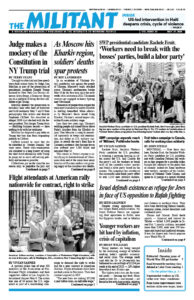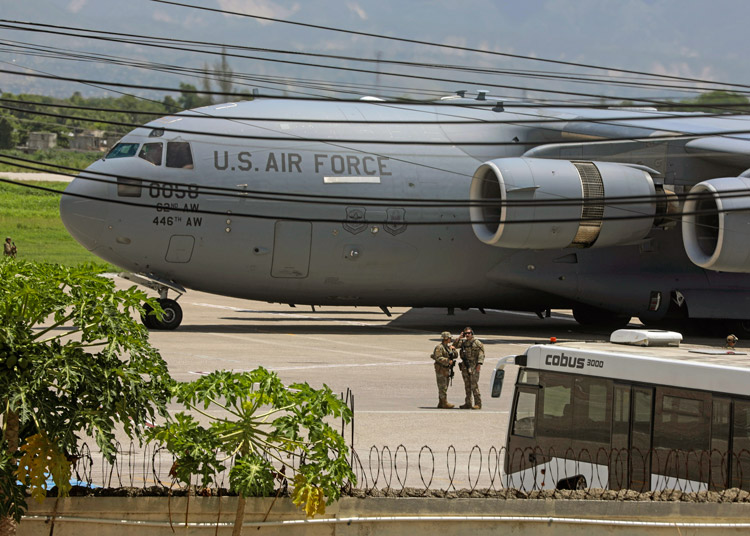Under the pressure of Washington and other capitalist powers, a transitional presidential council was established in Haiti April 25 prior to the arrival of a Kenyan-led foreign military force. It’s tasked with quelling the current levels of gang violence and cobbling together a government amid a severe social, economic and political crisis.
According to a plan concocted by Secretary of State Antony Blinken, and endorsed by the Caribbean Community trade bloc, the transitional government is charged with selecting a president, prime minister, a cabinet and a provisional electoral council to organize national and local elections by February 2026.
Haiti has been engulfed in a protracted political crisis marked by sharp factional battles among ruling circles that has dismantled any semblance of stable bourgeois democratic rule. The weak ruling class in Haiti has no solution to the social breakdowns that are fueled by the worldwide capitalist economic crisis.
Days before the announcement of the provisional council’s composition, Prime Minister Ariel Henry resigned. The new body is mainly composed of representatives of parties working people blame for the crisis.
Henry had faced calls to resign from many quarters — rival capitalist parties, gangs vying for power and working people angry that general elections have not been held in eight years. While in office, Henry did nothing to halt the advance of gangs, which now control 80% of Port-au-Prince, the capital. They’ve led to the killing of 5,000 people and the displacement of hundreds of thousands from their homes in the last year.
The latest spiral of gang violence exploded after the assassination of President Jovenel Moise in 2021, leaving different ruling-class factions fighting for control of the government. The conflict was settled by the U.N.-led Core Group, composed of the ambassadors of Brazil, Canada, the European Union, France, Germany, Spain, the U.S. and the Organization of American States. The group appointed Henry.
Most Haitians have very little confidence that the new transitional body will produce a way out of the crisis. “Thieves and gangs! That’s all they are!” yelled a man as he drove past the building where the council’s swearing-in ceremony took place, reports NBC News.
Conditions for working people in one of the world’s poorest countries have deteriorated in recent years. Cholera reappeared after a three-year absence in October 2022 and spread across the country. Much infrastructure has been destroyed, with less than half the health care facilities in Port-au-Prince functioning at normal capacity.
This will be the fourth foreign military intervention in Haiti since 1994. Unable to justify a direct U.S. intervention, the Biden administration negotiated the establishment of the Kenyan-led force with the support of the United Nations. In addition to some 1,000 Kenyan police officers, the governments of Bahamas, Bangladesh, Barbados, Belize, Benin, Chad and Jamaica have pledged police officers and soldiers for the intervention. Canadian Armed Forces recently completed training of some of these troops.
In early May U.S. military planes began transporting contractors to secure the Port-au-Prince airport and send supplies to build an operations base for the troops.
Gangs’ and rulers’ collusion
In the meantime, gang leaders are stepping up violence to get leverage as they seek an amnesty for their crimes and a seat at the table when the new government carves up the spoils. The current levels of violence have pulled back the curtain on the long history of collusion between political parties and gangs in Haiti.
The use of paramilitary gangs by Haitian ruling circles against their rivals and to repress the struggles by working people in city and countryside is not new. During the rule of the Francois and Jean-Claude Duvalier family from 1957 to 1986, the regime used the notorious Tonton Macoutes — a paramilitary and secret police force — to dispose of its enemies and to terrorize working people. Washington propped up the Duvalier dictatorship.
Suppression of unions by the government and armed thugs has encouraged U.S. and other foreign businesses to flock to Haiti to set up factories, especially in the textile and apparel industries, where they get away with paying workers less than $5 a day.
Poverty and insecurity, magnified by social disasters following hurricanes and a massive earthquake, has compelled hundreds of thousands of Haitians to migrate in recent decades to neighboring Dominican Republic, the U.S. and Canada.
Workers are only progressive force
Contrary to those who justify the impending foreign military intervention, Haiti’s underdevelopment and social crisis can only be solved by working people there. In fact, it’s workers and farmers who have been the driving force for political advances, not interventions orchestrated by the “democratic” imperialist powers.
In 1984, working-class resistance to intolerable conditions under Duvalier finally exploded. Over the next two years, a broad struggle involving tens of thousands in street mobilizations, strikes, and student protests across the country defied the brutal repression by Duvalier’s Tonton Macoutes and army.
They raised demands against rising food prices and economic policies imposed by the International Monetary Fund. They demanded the reopening of closed factories, a higher minimum wage and the disarmament of the paramilitary gangs.
This struggle got rid of one of the most brutal dictatorships in Latin America and built the confidence of working people in a way that many still remember today.
Gang leader Jimmy Cherizier, a former cop, opposes the interim government and demagogically vows to fight against corrupt oligarchs and traditional politicians.
“People sometimes talk about food distribution his gang has done to improve their image,” Ausler Bathard, a Haitian-born member of UNITE HERE in Miami told the Militant, “but they forget that he got that food through robbery and extortion. There is nothing good about him.
“A foreign police force will not solve anything. There is a deeper problem,” Bathard said. “Haiti is a country with many resources but the companies and the government do not manage them for the people, only for themselves.”
Steve Warshell in Miami contributed to this article.


